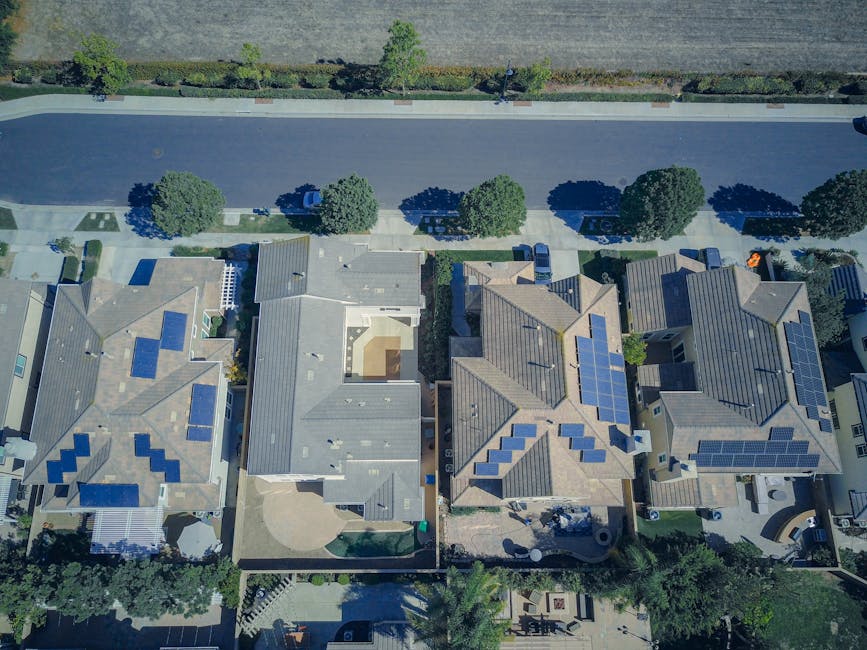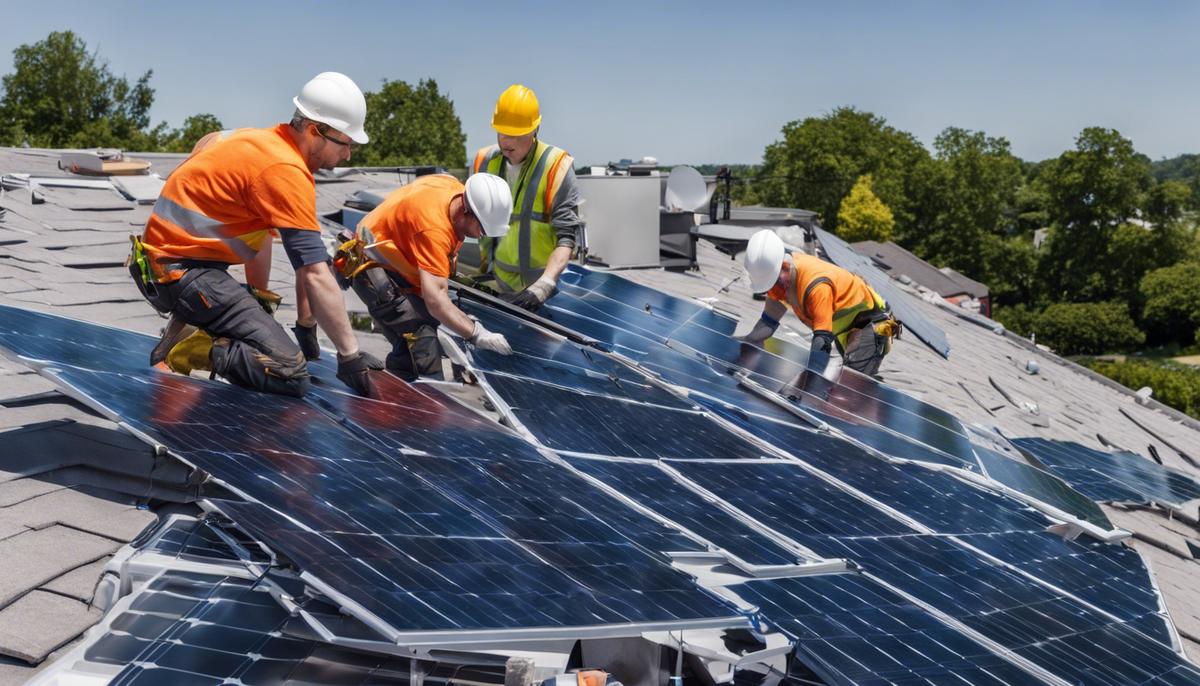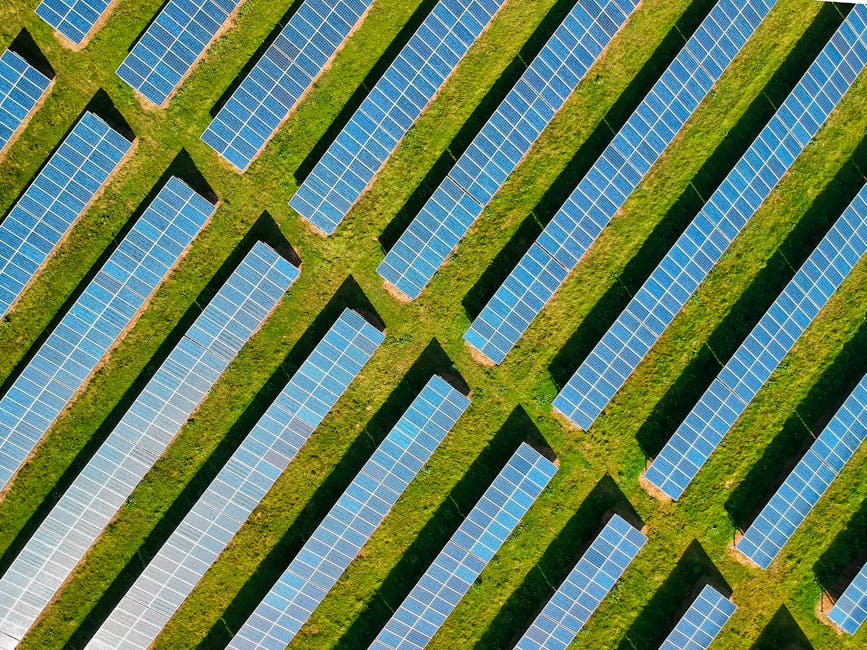As we stand at the crossroads of environmental sustainability and economic growth, the sun offers more than just daylight; it presents a beacon of hope for a cleaner, more equitable future. This narrative sheds light on how solar energy, a cornerstone of renewable resources, plays a pivotal role in shaping our planet's health, economy, and societal well-being. By harnessing the sun's power, we embark on a journey that promises not only to redefine our energy landscape but also to foster a world where progress and environmental stewardship go hand in hand.
Environmental Impact
Solar energy, harnessed directly from the Sun, stands as a vital renewable resource, offering a continuous supply that significantly reduces carbon emissions. It's like a quiet force, free from the anxiety of depletion tied to fossil fuels. Tapping into this solar abundance is akin to resetting our planet's health, ensuring clearer skies for us and the flora and fauna sharing this space.
When solar panels spread across rooftops or large solar farms extend under the open sky, they capture the Sun's energy without releasing carbon. This is an invisible battle against greenhouse gases—the contributors to global warming. Transitioning to solar energy means wielding a powerful tool in this ongoing fight, reducing the forces exacerbating climate change.
Beyond combating atmospheric issues, solar energy also conserves water. Unlike traditional electricity generation, which often relies on vast amounts of water for cooling, solar energy production is remarkably water-efficient. This characteristic not only spares our precious water reserves but also avoids the ecological disturbances common in water-intensive power generation methods.
By embracing solar energy, society takes a stride toward a sustainable energy future and preserving our planet's water resources. Each solar panel installed helps slow climate change's progress and preserves the natural harmony of resources for future generations. This transition heralds an era where energy consumption no longer means environmental sacrifice.
Adopting solar energy is a vote for a planet with clearer skies, cleaner waters, and a thriving future for generations to come—a vision both bold and achievable.

Economic Advantages
Turning to the economic landscape shaped by solar energy, the narrative reveals a tapestry of thoughtful investments, tangible savings, and growing job markets. The initial costs of solar panel installations contrast with the long-term financial benefits. While the upfront expenditure might seem daunting, the long-term financial forecast is bright, illuminating a path of savings and stability.
Reduced electricity bills serve as a guiding light, encouraging the adoption of solar power. With each passing day, solar panels diligently convert sunlight into electricity, reducing monthly energy expenses for households and businesses. This pursuit of harnessing the sun's energy is not only environmentally responsible but also economically prudent. Households witness their dependence on the grid diminish, embracing the promise of financial freedom.
Beyond monthly savings, solar panels add value to properties. A home equipped with a solar energy system speaks of modernity, sustainability, and foresight—qualities that attract prospective buyers with the promise of lower utility costs and a reduced carbon footprint. Studies show that homes with solar installations command higher sales prices, an economic advantage that can offset the initial setup investments.
The economic prowess of solar power is further bolstered by government incentives and rebates. The array of financial assistance varies by location, demonstrating a collective commitment to a greener future. These incentives ease the burden of initial costs and accelerate the journey towards accessible solar energy adoption. They bridge economic divides, inviting diverse participants to join the solar revolution.
Solar energy's narrative also weaves in the societal benefit of job creation, a vital aspect in today's evolving job market. The shift towards green technologies creates opportunities in research, manufacturing, installation, operations, and maintenance sectors of the renewable energy landscape. Each solar panel installed is a seed of opportunity, nurturing skills, promoting sustainable practices, and fueling local economies. This gateway to innovation and employment cements solar energy's role in economic growth and establishes the domain as an enticing arena for aspiring professionals.
The economic threads of solar energy—lower utility bills, enhanced property values, government incentives, and job creation—form a canvas of economic advantages. It's framed not just by the promise of individual financial well-being but as a cornerstone of collective economic resilience and growth. Amidst the shifts and turns of economic fortunes, solar energy stands as a bastion of opportunity, proof that investing in sustainability is also investing in a prosperous future for all.

Technological Advancements
The story of solar panel technology is marked by remarkable leaps in efficiency, inventive storage solutions, and seamless integration into existing electrical grids. Each stride in this technology showcases human ingenuity and underscores the promise of a future where solar energy's potential is fully realized, catering to a broad spectrum of applications.
The efficiency of solar panels has seen considerable increases through research and material innovations. These advancements have transformed solar panels into powerhouses of clean energy while reducing the spatial footprint required. Today's solar panels do more with less, embodying the principle of sustainable abundance.
Energy storage is another arena marked by groundbreaking developments. Sophisticated battery technologies, such as lithium-ion and solid-state batteries, have revolutionized solar energy storage, enhancing the viability of solar power. These advancements allow for stored solar energy to be dispatched efficiently and reliably, ensuring solar power availability across day and night cycles.
Integration with existing electrical grids showcases a symbiotic relationship between solar power and traditional energy infrastructures. Smart grid technology, capable of accommodating and managing solar-generated electricity, fosters a seamless union between renewable and conventional power systems. This integration challenges the notion of solar as an outlier, advocating for its pivotal role in a diversified and resilient energy portfolio.
Emerging technologies push the boundaries of what's possible, promising to propel solar energy into new realms of accessibility and efficiency. Innovations such as perovskite solar cells offer the potential for more cost-effective and efficient solar panels. Building-integrated photovoltaics (BIPV) open up possibilities for solar capabilities to be woven into urban infrastructure, marrying form and function in sustainable development.
Each technological leap not only reduces the costs associated with solar power but also amplifies its viability across diverse settings, from remote rural landscapes to urban centers. These advancements beckon us toward a reality where our energy needs are met with innovation and the sun's renewable splendor.
The journey of technological advancements in solar energy resonates with the hope of expanding solar energy's horizons, making it an integral contributor to our global energy tapestry. As we navigate the challenges and opportunities ahead, the evolution of solar technology promises a brighter future and invites us to reimagine our relationship with energy, the environment, and each other in profound and enduring ways.

Social and Health Benefits
Beneath the surface of solar energy's economic and environmental victories lies a mosaic of social and health benefits, quietly transforming communities and ushering in equity and well-being. The embrace of solar power transcends technical achievements, breathing life into a vision of purer air and a society woven with threads of inclusivity and access.
Solar power installations light more than homes; they ignite a beacon for healthier communities, where air and water are safeguarded from pollutants—a common collateral in the era of fossil fuel dominance. By significantly reducing emissions of harmful substances such as sulfur dioxide, nitrogen oxides, and particulate matter, solar energy installations act as silent sentinels, guarding air quality in our cities and towns. This reduction in air pollution translates into tangible health benefits, decreasing the prevalence of respiratory and cardiovascular diseases and cutting through the smog that often shrouds urban landscapes. The shift toward solar becomes an act of environmental preservation and a commitment to public health.
Water, our planet's life-sustaining force, also reaps the rewards of solar energy's gentle touch. Traditional power generation methods demand vast amounts of water, straining local resources and ecosystems. In contrast, solar power stands as a paragon of conservation, demanding minimal water use and ensuring that rivers and lakes continue to thrive, unfettered by the thirst of energy production. The adoption of solar energy supports cleaner skies and sustains the vibrancy of our aquatic realms.
The narrative of solar power is enriched further when viewed through the lens of social equity. Solar energy, with its promise of decentralized and distributed generation, holds the keys to democratizing energy access. Innovative models such as community solar projects emerge as powerful conduits for this vision, breaking down barriers that have traditionally marginalized low-income households and renters from harnessing solar's benefits. By enabling individuals to invest in or subscribe to shared solar farms, these initiatives open the gates to renewable energy's advantages—lower utility costs, reduced carbon footprints, and participation in the green economy—irrespective of homeownership or financial means.
Community solar programs nourish the roots of energy democracy and cultivate fertile ground for social cohesion and empowerment. As communities rally around the shared goal of clean, affordable power, bonds are forged, and voices that were once silenced find a resonant chorus. Solar energy becomes a catalyst for community resilience, civic engagement, and a brighter socio-economic future for all participants.
The social and health dimensions of solar energy invite us to look beyond its luminous arrays and into the profound impact it holds for humanity. This is an invitation to a world where clean energy is the linchpin for healthy communities, water is conserved, and social equity flourishes under the sun's nurturing gaze. In harnessing solar power, we capture not only photons but also a holistic vision that places well-being, inclusivity, and resilience at the heart of our collective journey toward sustainability.

In conclusion, the adoption of solar energy represents more than a strategic move towards sustainable living; it embodies a commitment to nurturing a planet where future generations can thrive. By prioritizing solar power, we make a profound declaration of our dedication to clean energy, economic resilience, and social equity. This is not merely an investment in technology but a bold step forward in our collective quest for a harmonious balance between human advancement and environmental preservation.

- Kabir E, Kumar P, Kumar S, Adelodun AA, Kim KH. Solar energy: Potential and future prospects. Renew Sustain Energy Rev. 2018;82:894-900.
- Mekhilef S, Saidur R, Safari A. A review on solar energy use in industries. Renew Sustain Energy Rev. 2011;15(4):1777-1790.
- Panwar NL, Kaushik SC, Kothari S. Role of renewable energy sources in environmental protection: A review. Renew Sustain Energy Rev. 2011;15(3):1513-1524.
- Sampaio PGV, González MOA. Photovoltaic solar energy: Conceptual framework. Renew Sustain Energy Rev. 2017;74:590-601.
- Kannan N, Vakeesan D. Solar energy for future world: A review. Renew Sustain Energy Rev. 2016;62:1092-1105.
Meet Writio, your AI content writer extraordinaire! This article was crafted by Writio.
